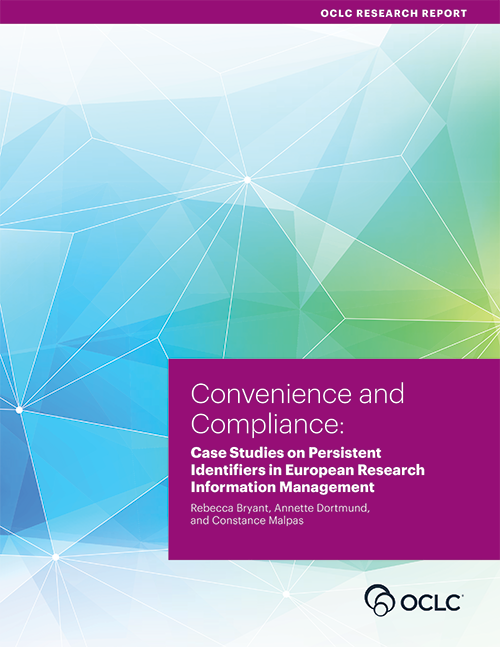Convenience and Compliance: Case Studies on Persistent Identifiers in European Research Information Management
by Rebecca Bryant, Annette Dortmund, and Constance Malpas
Abstract:
This report provides university and research library leaders with useful insights on emerging practices and infrastructures in European research information management (RIM), on the current and future role of persistent person and organization identifiers, and, more specifically, on incentives and barriers to adoption in three different national settings—Finland, Germany, and the Netherlands—in order to better understand the decision-making dynamics in this space.
Through research and semi-structured interviews with practitioners and stakeholders within universities, national libraries, and collaborative information and communications technology (ICT) organizations in Finland, Germany, and the Netherlands, the authors explore local institutional RIM practices and examine the role—perhaps even the necessity—of persistent identifiers for the facilitation of group-scale RIM activity and data aggregation. This work was part of a joint research collaboration with LIBER (Ligue des Bibliothèques Européennes de Recherche – Association of European Research Libraries).
This report documents a rapidly changing RIM landscape, as CRIS systems aggregate more types of data, harvest publications from a growing number of external sources, and serve as an important node interoperating within a large, complex scholarly communications landscape.
Key findings:
- External reporting requirements appeared as the strongest driver of CRIS adoption and usage.
- More recently, open-access mandates are also beginning to influence research output and publication management priorities.
- A central component of research information management practice at all of the institutions studied was the collection of a university bibliography: the publications metadata representing the scholarly output of the institution.
- Local institutional needs are also drivers of CRIS adoption and RIM practice. Institutions particularly sought information to support internal reporting and decision support activities, such as support for strategic planning, analysis of research activities, identification of institutional participation in specific programs or collaborations, and collection and analysis of a broad array of research outputs, not just publications.
- Stakeholders are eager to improve workflow efficiencies and see potential for persistent identifiers, in particular person (author or researcher) identifiers, to support this need. Adoption of persistent person identifiers to support name disambiguation and improved publications metadata harvesting is underway in all three national environments, and ORCID is widely perceived as becoming a de facto standard.
- Universities and ICT organizations are following international developments around organizational identifiers with interest, but the authors found no activities to integrate standardized organizational identifiers into CRIS systems.
- Libraries are a fairly new but increasingly important partner in this space, with responsibilities in publication management and user support, particularly as CRIS systems are increasingly used to monitor, track, and report on open-access activities.
Suggested citation:
Bryant, Rebecca, Annette Dortmund, and Constance Malpas. 2017. Convenience and Compliance: Case Studies on Persistent Identifiers in European Research Information Management. Dublin, OH: OCLC Research. https://doi.org/10.25333/C32K7M.
Quick Links
- Short URL: oc.lc/rim-europe
- ISBN: 978-1-55653-038-8
- DOI: 10.25333/C32K7M
- WorldCat: 1014027562
Related Links
